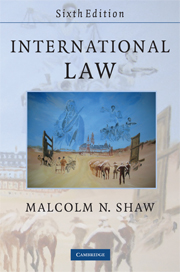Book contents
- Frontmatter
- Contents
- Preface
- Table of cases
- Table of treaties and selected other international instruments
- List of abbreviations
- 1 The nature and development of international law
- 2 International law today
- 3 Sources
- 4 International law and municipal law
- 5 The subjects of international law
- 6 The international protection of human rights
- 7 The regional protection of human rights
- 8 Individual criminal responsibility in international law
- 9 Recognition
- 10 Territory
- 11 The law of the sea
- 12 Jurisdiction
- 13 Immunities from jurisdiction
- 14 State responsibility
- 15 International environmental law
- 16 The law of treaties
- 17 State succession
- 18 The settlement of disputes by peaceful means
- 19 The International Court of Justice
- 20 International law and the use of force by states
- 21 International humanitarian law
- 22 The United Nations
- 23 International institutions
- Some useful international law websites
- Index
13 - Immunities from jurisdiction
Published online by Cambridge University Press: 05 June 2012
- Frontmatter
- Contents
- Preface
- Table of cases
- Table of treaties and selected other international instruments
- List of abbreviations
- 1 The nature and development of international law
- 2 International law today
- 3 Sources
- 4 International law and municipal law
- 5 The subjects of international law
- 6 The international protection of human rights
- 7 The regional protection of human rights
- 8 Individual criminal responsibility in international law
- 9 Recognition
- 10 Territory
- 11 The law of the sea
- 12 Jurisdiction
- 13 Immunities from jurisdiction
- 14 State responsibility
- 15 International environmental law
- 16 The law of treaties
- 17 State succession
- 18 The settlement of disputes by peaceful means
- 19 The International Court of Justice
- 20 International law and the use of force by states
- 21 International humanitarian law
- 22 The United Nations
- 23 International institutions
- Some useful international law websites
- Index
Summary
In the previous chapter, the circumstances in which a state may seek to exercise its jurisdiction in relation to civil and criminal matters were considered. In this chapter the reverse side of this phenomenon will be examined, that is those cases in which jurisdiction cannot be exercised as it normally would because of special factors. In other words, the concern is with immunity from jurisdiction and those instances where there exist express exceptions to the usual application of a state's legal powers.
The concept of jurisdiction revolves around the principles of state sovereignty, equality and non-interference. Domestic jurisdiction as a notion attempts to define an area in which the actions of the organs of government and administration are supreme, free from international legal principles and interference. Indeed, most of the grounds for jurisdiction can be related to the requirement under international law to respect the territorial integrity and political independence of other states.
Immunity from jurisdiction, whether as regards the state itself or as regards its diplomatic representatives, is grounded in this requirement. Although constituting a derogation from the host state's jurisdiction, in that, for example, the UK cannot exercise jurisdiction over foreign ambassadors within its territory, it is to be construed nevertheless as an essential part of the recognition of the sovereignty of foreign states, as well as an aspect of the legal equality of all states.
- Type
- Chapter
- Information
- International Law , pp. 697 - 777Publisher: Cambridge University PressPrint publication year: 2008



